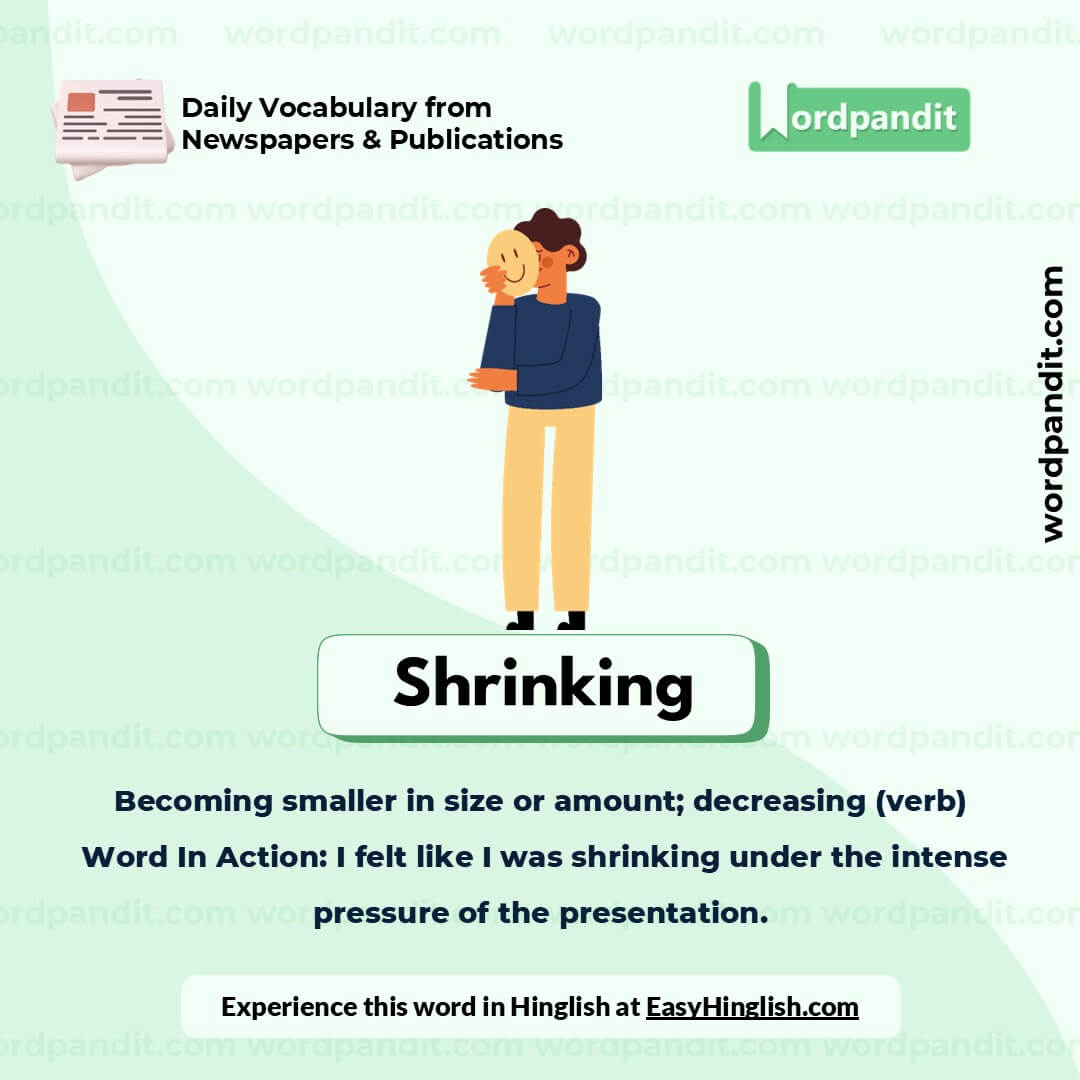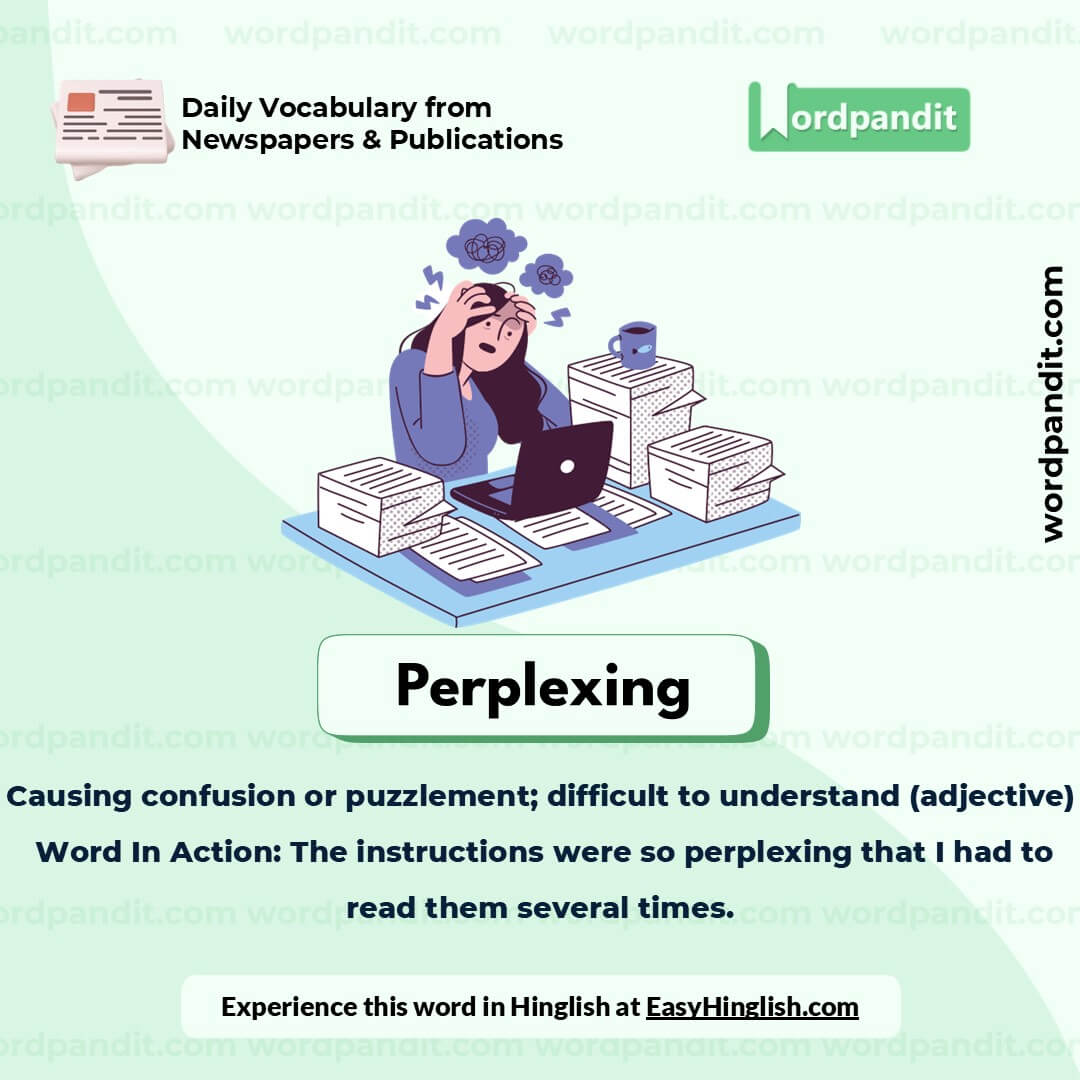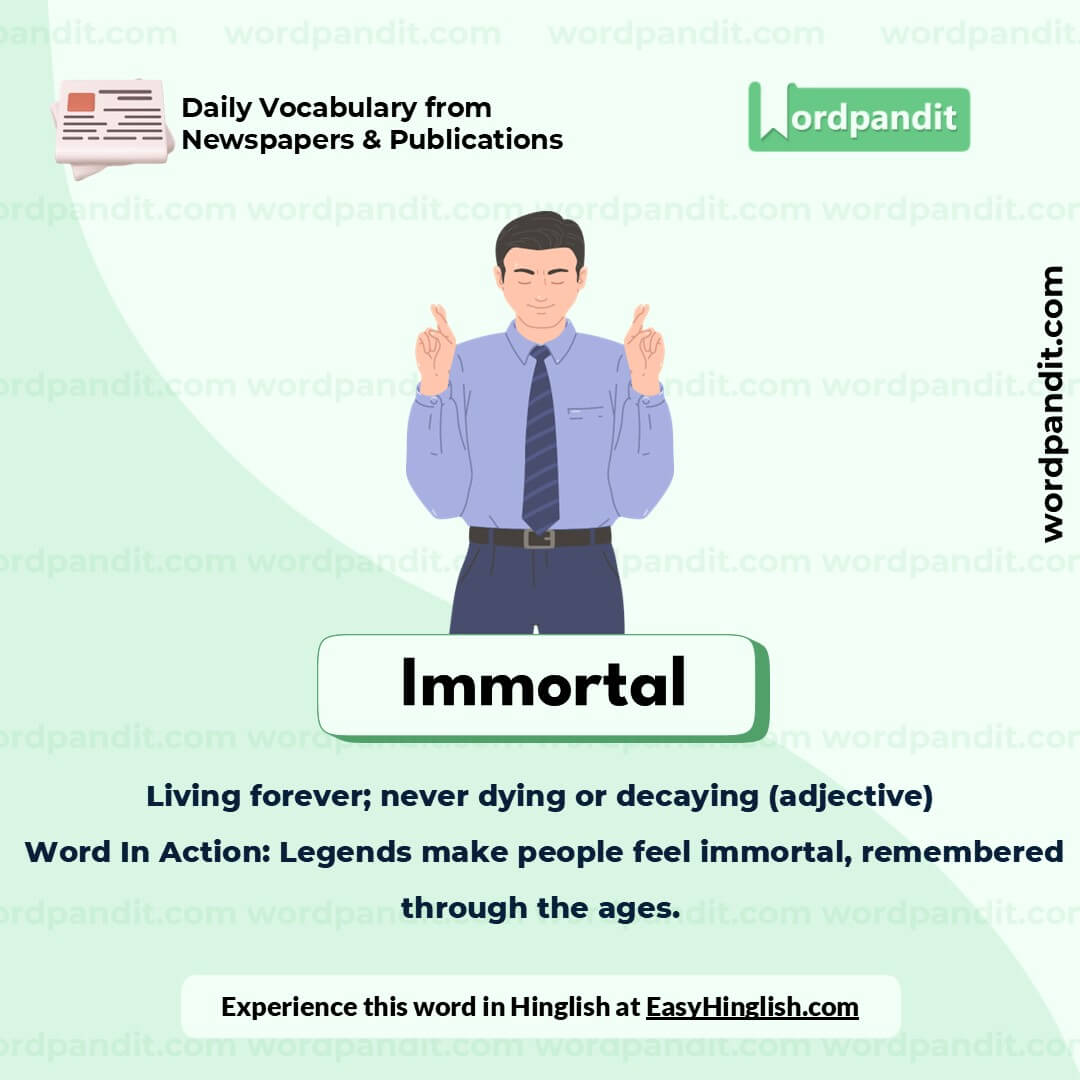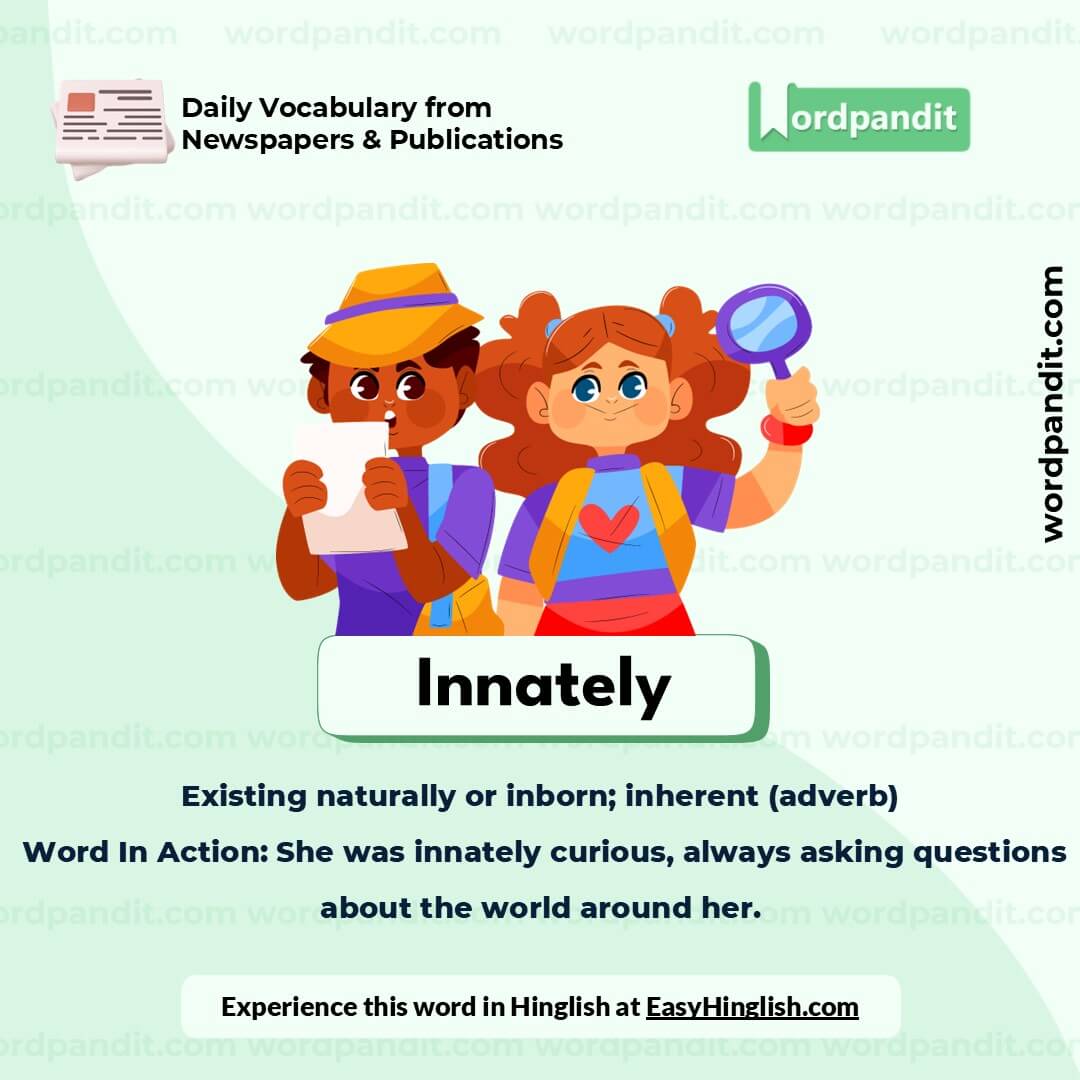Daily Vocabulary from Indian Newspapers and Publications
Welcome to Wordpandit’s Indian Vocabulary Hub
At Wordpandit, we understand the importance of staying rooted in the local context while expanding your language skills. This section focuses on enriching your vocabulary with words and phrases drawn from India’s leading newspapers and publications, ensuring you're learning vocabulary that is practical, relevant, and uniquely Indian.
Why Indian Sources Matter
We believe that the best way to master any language is by immersing yourself in local content. That’s why we carefully curate vocabulary from top Indian publications, including:
- The Hindu
- The Times of India
- The Economic Times
- Hindustan Times
- Live Mint
- The Indian Express
- And many others...
Stay Updated, Stay Relevant
With daily updates from Indian news sources, you’ll be consistently learning words that reflect the trends and shifts in Indian society and culture. Our focus is to provide vocabulary that enhances your understanding of the language in an Indian context.
How Wordpandit Supports Your Goals
Whether you’re preparing for exams, aiming to improve your professional communication, or simply want to stay connected with the latest Indian vocabulary, Wordpandit is here to guide you every step of the way.
Learn with a Practical Approach
Our interactive learning methodology includes real-world examples, engaging activities, and context-specific usage to ensure that every word becomes part of your active vocabulary.
Dive into Indian Vocabulary Today!
Why Choose Wordpandit?
Practical Learning: Focus on words you'll actually encounter in real-world reading, enhancing your comprehension and communication skills.
Diverse Content: From current affairs to scientific breakthroughs, our varied sources expose you to vocabulary across multiple domains.
Effortless Integration: Make Wordpandit a part of your daily routine. Just a few minutes each day can significantly boost your lexicon over time.
Your Path to Vocabulary Mastery
- Visit our Daily Vocabulary section regularly
- Explore new words and their usage in context
- Practice incorporating these words into your own writing and speech
- Track your progress as your vocabulary expands
Start Your Journey Today
Embark on your vocabulary enhancement journey with Wordpandit. By consistently engaging with our daily posts, you'll build a robust vocabulary that serves you well in academic, professional, and personal contexts.
Remember, a word a day keeps linguistic limitations at bay. Make Wordpandit your daily companion in the quest for vocabulary excellence!
WORD-1: Shrinking
Context:
"It was not that the warning signals were absent. Analysts have been saying it – that real incomes are shrinking; and consumption is slowing down. But it is when the big stakeholders get hit, it is time for everyone to wake up!" - The New Indian Express
Explanatory Paragraph:
The term shrinking often describes something becoming smaller or reducing in size, quantity, or importance. In economic terms, shrinking can refer to a decrease in resources like income, profits, or consumption, signaling a possible economic slowdown or financial challenge.
Meaning: Becoming smaller in size or amount; decreasing (verb)
Pronunciation: SHRIHNK-ing
Difficulty Level: ⭐⭐ (Basic)
Etymology: From Old English scrincan meaning "to wither or contract"
Synonyms & Antonyms:
Synonyms: decreasing, reducing, contracting, diminishing, declining
Antonyms: growing, expanding, increasing, enlarging
Usage Examples:
- As the water supply dwindled, the river began shrinking dramatically.
- The company's profits have been shrinking for the past few quarters.
- She noticed her clothes were shrinking after repeated hot washes.
- With job opportunities shrinking, many people are seeking new skills.
Cultural Reference:
The phrase "shrinking violet" describes someone who is shy or lacks confidence, often hesitant to step into the spotlight.
Think About It:
In what areas of life or society might shrinking be beneficial, and where might it indicate a problem?
Quick Activity:
List five things that could shrink over time, and think about why they might do so.
Memory Tip:
Think of "shrinking" as "getting smaller" like a wool sweater in a hot wash to recall its meaning of reduction.
Real-World Application:
The term "shrinking" is used in economics, finance, and everyday life to describe decreases in income, population, resources, or physical items—helpful when discussing limitations or declines.
WORD-2: Stakeholders
Context:
"It was not that the warning signals were absent. Analysts have been saying it – that real incomes are shrinking; and consumption is slowing down. But it is when the big stakeholders get hit, it is time for everyone to wake up!" - The New Indian Express
Explanatory Paragraph:
In business and policy contexts, stakeholders refer to individuals or groups that have an interest, investment, or influence in an organization or decision. These might include employees, customers, shareholders, and even the community. When stakeholders are impacted, it often reflects broader issues that could affect the organization or economy as a whole.
Meaning: People or groups with an interest, share, or investment in an organization or project (noun)
Pronunciation: STEYK-hohl-derz
Difficulty Level: ⭐⭐⭐ (Intermediate)
Etymology: Derived from "stake" (an interest or share in something) and "holder" (one who possesses)
Synonyms & Antonyms:
Synonyms: investors, shareholders, partners, collaborators, backers
Antonyms: outsiders, opponents, competitors, bystanders
Usage Examples:
- The stakeholders were keen to see how the new policy would impact their investments.
- Environmental stakeholders pushed for greener practices within the company.
- All stakeholders must be consulted before making a major decision.
- Employees, as key stakeholders, have a vested interest in the company's success.
Cultural Reference:
In the world of corporate social responsibility (CSR), "stakeholders" have become essential as businesses increasingly consider the impact of their decisions on a range of interested parties, from local communities to global environmental concerns.
Think About It:
How might different stakeholders view the same decision differently based on their unique interests?
Quick Activity:
Identify three stakeholders in a school setting and describe what each group values most.
Memory Tip:
Remember "stakeholders" by visualizing people holding "stakes" or interests in a project or organization.
Real-World Application:
The term "stakeholders" is widely used in business, government, and non-profits to emphasize the importance of considering the needs and interests of all parties involved in or affected by a decision.
WORD-3: Perplexing
Context:
"We are never truly alone. Loneliness is perplexing and painful, but essentially it is an illusion, a mask created by the surface consciousness." - The Times of India
Explanatory Paragraph:
The word perplexing describes something that causes confusion or difficulty in understanding. When a situation or problem is perplexing, it leaves people puzzled and uncertain, often requiring deeper thought or analysis to make sense of it.
Meaning: Causing confusion or puzzlement; difficult to understand (adjective)
Pronunciation: per-PLEK-sing
Difficulty Level: ⭐⭐⭐ (Intermediate)
Etymology: From Latin perplexus meaning "entangled" or "confused"
Synonyms & Antonyms:
Synonyms: puzzling, confusing, baffling, bewildering, mystifying
Antonyms: clear, straightforward, simple, understandable
Usage Examples:
- The puzzle was so perplexing that even the best solvers struggled with it.
- Her reaction was perplexing, leaving everyone unsure of what she truly meant.
- The new technology is perplexing to those unfamiliar with it.
- The plot of the mystery novel was filled with perplexing twists and turns.
Cultural Reference:
In literature, particularly in mystery novels, perplexing plots keep readers intrigued and guessing. Authors like Agatha Christie often created stories with perplexing clues that led readers through intricate webs of mystery.
Think About It:
Why do some people find certain topics or problems more perplexing than others do? How might background or experience play a role?
Quick Activity:
Think of a time when something was perplexing to you. What steps did you take to understand it better?
Memory Tip:
Associate "perplexing" with "puzzling" to remember its meaning of causing confusion or difficulty in understanding.
Real-World Application:
The word "perplexing" is useful when describing complex problems in fields like science, technology, and psychology, where challenges often require deep thinking and problem-solving skills.
WORD-4: Immortal
Context:
"Losing a ‘soulmate’ is unbearable if one doesn’t recognise the immortal spirit residing in all. This truth is our first step away from loneliness. It is illusory because, innately, we are divine and one with everything." - The Times of India
Explanatory Paragraph:
The word immortal refers to something or someone that lives forever or cannot be destroyed. Often used to describe divine beings, spirits, or legends, immortal signifies an existence beyond the limits of mortality and time, making it a symbol of eternal life or legacy.
Meaning: Living forever; never dying or decaying (adjective)
Pronunciation: ih-MOR-tl
Difficulty Level: ⭐⭐⭐ (Intermediate)
Etymology: From Latin immortalis, meaning "not mortal" or "deathless"
Synonyms & Antonyms:
Synonyms: eternal, undying, everlasting, deathless, imperishable
Antonyms: mortal, finite, perishable, transient, ephemeral
Usage Examples:
- The hero's legendary deeds made him seem immortal in the eyes of his followers.
- Some believe that art and literature grant a form of immortality to their creators.
- In many cultures, gods are considered immortal beings, unaffected by time.
- The idea of an immortal soul brings comfort to those facing loss.
Cultural Reference:
Throughout mythology, the concept of immortality is prominent, with figures like the Greek gods and figures in Hindu and Norse mythology often depicted as immortal. This idea has also inspired countless stories in literature and film, exploring both the blessings and burdens of eternal life.
Think About It:
If humans could achieve immortality, how might society and individual values change?
Quick Activity:
Write down three things you believe might be considered "immortal" in human culture, such as ideas, values, or achievements.
Memory Tip:
Think of "immortal" as "in-mortal" or "not mortal" to remember it means "not subject to death."
Real-World Application:
The word "immortal" is used in discussions about legacies, beliefs, and ideals, where it represents ideas or accomplishments that continue to influence long after their creators are gone.
WORD-5: Innately
Context:
"Losing a ‘soulmate’ is unbearable if one doesn’t recognise the immortal spirit residing in all. This truth is our first step away from loneliness. It is illusory because, innately, we are divine and one with everything." - The Times of India
Explanatory Paragraph:
The word innately describes qualities or traits that are inherent or natural to someone or something, rather than learned or acquired. When we say someone is innately kind, we mean kindness is part of their core nature.
Meaning: Existing naturally or inborn; inherent (adverb)
Pronunciation: in-NEYT-lee
Difficulty Level: ⭐⭐⭐ (Intermediate)
Etymology: From Latin innatus, meaning "inborn" or "natural"
Synonyms & Antonyms:
Synonyms: inherently, naturally, intrinsically, essentially, fundamentally
Antonyms: artificially, externally, learned, acquired
Usage Examples:
- Some people are innately curious, always eager to learn new things.
- She was innately compassionate, always helping those in need.
- Despite his lack of training, he had an innate talent for music.
- The capacity for language may be innately present in human beings.
Cultural Reference:
In philosophy, discussions of innate qualities have appeared since ancient times. Thinkers like Plato suggested that certain forms of knowledge and characteristics are innately present in humans, influencing theories of human nature and education.
Think About It:
What qualities or abilities do you believe humans might possess innately, and how could these impact their development?
Quick Activity:
Identify three qualities that you believe are innately part of human nature, and explain why you think they are inherent.
Memory Tip:
Remember "innately" by associating it with "in-nature," as it refers to qualities that are naturally part of one's being.
Real-World Application:
The word "innately" is often used in psychology, education, and philosophy to discuss natural human traits, abilities, and tendencies, helping us understand what may be part of our core nature versus what is learned.















